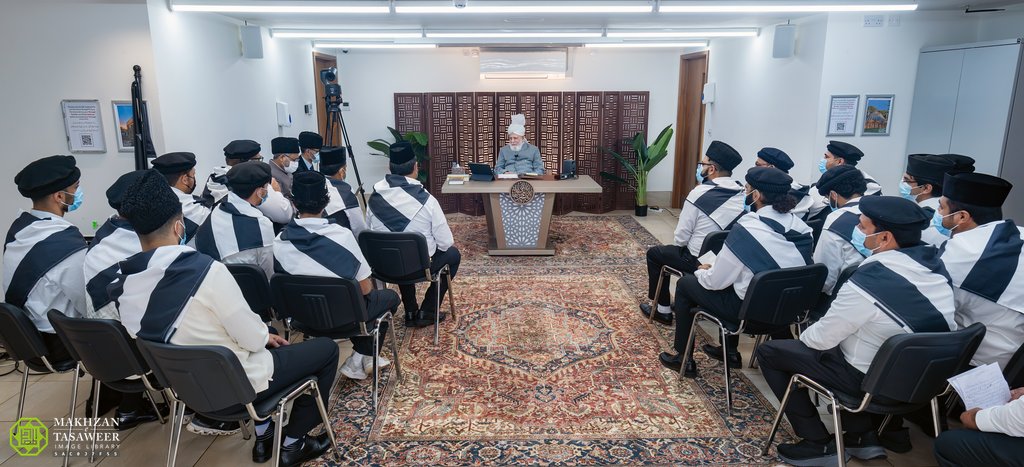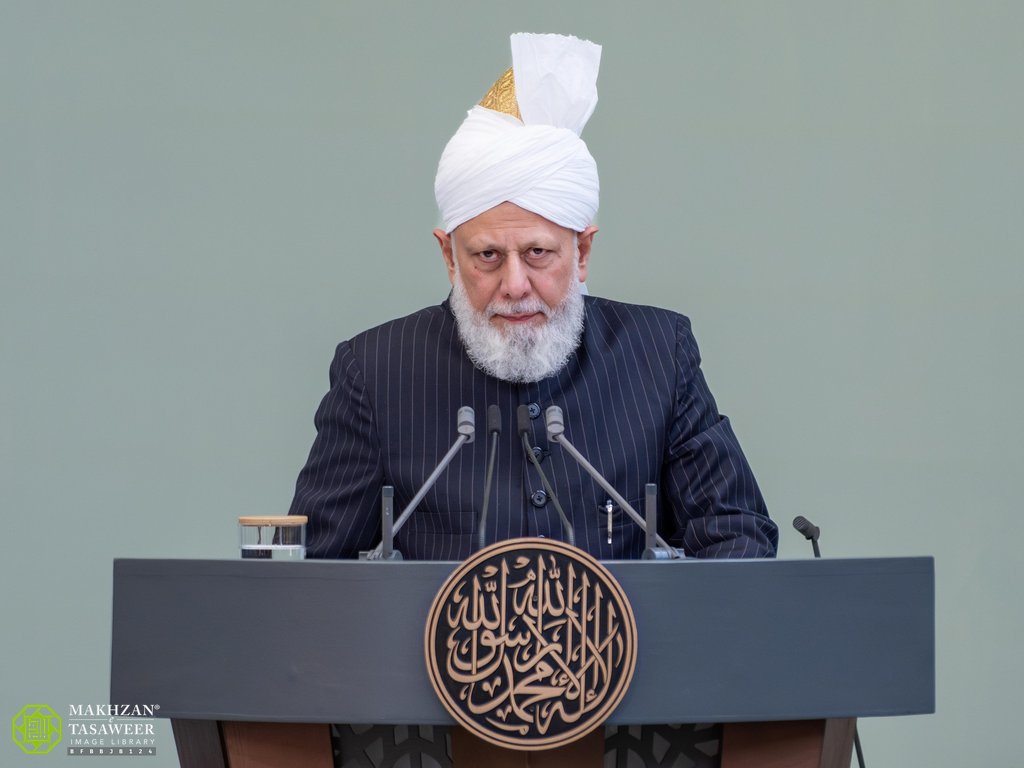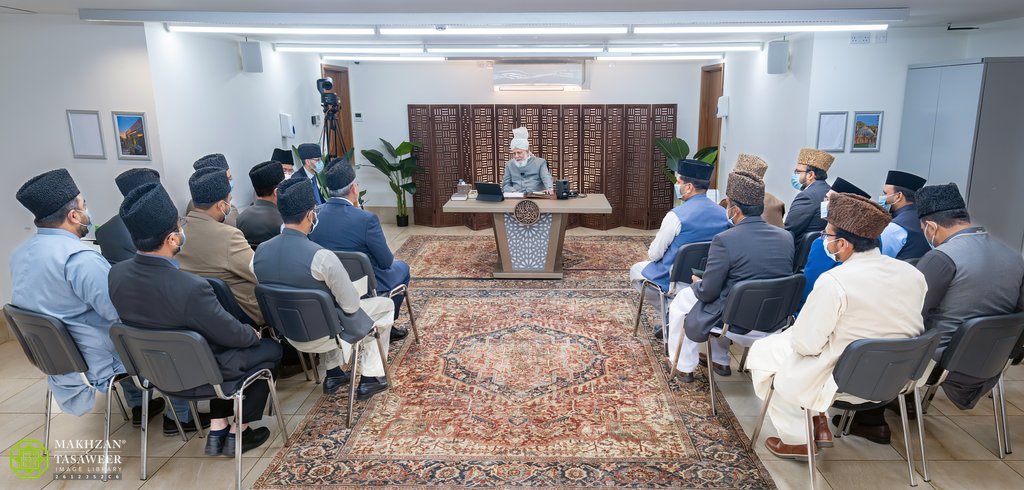
Head Of Ahmadiyya Muslim Community, Hazrat Mirza Masroor Ahmad, Guides Young American Muslims From The Midwest Region
“The most difficult time was when I was appointed [as Khalifa]. After that, Allah Himself created ease. Allah alone is managing everything Himself.” – Hazrat Mirza Masroor Ahmad
On 13 September 2025, the World Head of the Ahmadiyya Muslim Community, the Fifth Khalifa, His Holiness, Hazrat Mirza Masroor Ahmad, held a meeting with members of the Ahmadiyya Muslim Youth Association (Khuddam-ul-Ahmadiyya) from the Midwest Region of the United States.
Representatives from nine states, including Chicago, Zion, Minnesota, and Kansas City, were in attendance. During the meeting, members of the Youth Association had the opportunity to ask His Holiness questions on a range of matters relating to their faith and contemporary issues.
One question related to the Khuddam pledge [the pledge of the Ahmadiyya Muslim Youth Association], which calls on members to be ready to sacrifice their time, wealth, honour, and lives not only for their faith, but also for their nation and country.
The attendee asked how this should be understood when one’s country restricts religious freedom, such as in Pakistan.
In response to this question, Hazrat Mirza Masroor Ahmad stated:
“As long as we live in Pakistan or in any place where there are restrictions on our religion, we obey the law of the land so long as it does not disturb [the practice of] our religious matters… For example, they [Pakistan’s laws] say we cannot offer our five daily prayers – but we do. They say we cannot recite the Kalimah [the Islamic declaration of faith] – but we recite it. They say you cannot claim to be a Muslim – but we believe ourselves to be Muslims… Apart from that, we are law-abiding people. We do not disturb the peace of society, we do not usurp people’s rights… In this way, we abide by all the laws of the land. If our lives are required [for our country], then yes, we are ready to sacrifice our lives. There are quite a number of Ahmadi Muslims in Pakistan in the army. In this way, we are fulfilling our promise.”
Another attendee sought His Holiness’ guidance about inviting political figures or public guests to Ahmadiyya Muslim Community events who, may claim to be peaceful, but support funding wars in Gaza or other parts of the world.
“If you have a close relation with those people, you can tell them that our community’s practice and teaching is to help all those in need and to establish peace and harmony in society. Therefore, this is not only our slogan but we want to apply it in our lives and want to establish it in the world as well. [However], if they say ‘no’, then do not call them to our functions. We do not need any worldly help from these people…”
Responding to a question about preserving the Urdu language among Ahmadi Muslim families in America, Hazrat Mirza Masroor Ahmad stated:
“If your parents speak Urdu with you, then you will learn it. Children brought up here spend a good amount of time in school and read books in English. So, this is why they speak and read English. However, at home, try to speak to them in Urdu and gradually they will pick it up… This is according to everyone’s individual capability and potential; some will grasp it better than others, but at least they will understand. There should also be classes run by the Waqf-e-Nau department to teach children Urdu.”
A young attendee asked His Holiness about his favourite incident from the life of the Holy Prophet Muhammad (peace and blessings of Allah be upon him).
In response, Hazrat Mirza Masroor Ahmad stated:
“Every event in the life of the Holy Prophet (peace and blessings of Allah be upon him) is a lesson for us. That is why Allah has said in the Holy Quran that he is ‘an excellent model’ for mankind and his practices ought to be followed. Countless examples exist, some of which I narrated in the Friday Sermon yesterday. His every act, his every command, is such that if you are to follow it, you will improve your life.”
Another question concerned whether a person carrying debts could still perform the Hajj pilgrimage. His Holiness explained:
“The conditions for performing Hajj are that one should have the means to travel, there should be peace and safety, one should be able to bear the expenses, and one should be in good health. These are the conditions. That is why, in one’s whole life, the five daily prayers are obligatory every day, fasting is obligatory for one month each year, and Hajj is obligatory only once in a lifetime if you fulfil these conditions. So, if you think that you can manage both – that you can pay off your loans and on time, and still go for Hajj, and that financially you will not be overburdened – then it is fine, you may go. But it is better to first pay off your debts and then perform Hajj or Umrah.”
Hazrat Mirza Masroor Ahmad continued:
“If you are offering your five daily prayers properly, then Allah the Almighty will accept that too. What matters is a person’s intention. There was once a poor man who had collected money over many years to perform Hajj. When he was ready to go, he smelled the aroma of meat being cooked at his neighbour’s home. He sent his child to request a little from his neighbour, as they had not eaten meat for a long time. When the child went, the neighbour refused and said, ‘This food is not for you.’ The man himself then went to the neighbour and asked, ‘You are eating meat – why can we not share in it?’ The neighbour replied, ‘It has been an entire week since my children and I have eaten anything. We were starving. I found a dead donkey outside, so I brought its meat. Carrion meat is permissible for us in our state of starvation, but it is not permissible for you.’
Continuing to narrate the incident, His Holiness said:
“The man who had collected money for Hajj was so struck by grief at hearing this. He thought, ‘My neighbour was starving and I did not know. I was at least eating something all this time; I could have given him something.’ Immediately, he took all the money he had saved for Hajj and gave it to his neighbour, saying, ‘Throw away that impure food and buy clean food. Eat it yourself and feed it to your children.’
“At that moment, Allah the Almighty informed a saintly elder in Makkah that of all those who had come for Hajj that year, none of their Hajj had been accepted except that of this man. When the elder later met him, he asked, ‘What did you do?’ The man replied, ‘I had collected money for Hajj, but I gave it all to my starving neighbour.’ So, even though he never went for Hajj, Allah accepted his Hajj.
“Therefore, if you are doing good deeds, looking after the poor, offering your prayers properly, and your intention is to perform Hajj, then when Allah grants the opportunity, you will go. But even before that, Allah can accept your Hajj. Even without performing it physically, Hajj can be accepted if one has a righteous intention. A good intention is essential.”
Another attendee asked His Holiness about the most challenging period of his Caliphate, and how God Almighty helped His Holiness in that moment.
In response, Hazrat Mirza Masroor Ahmad said:
“The most difficult time was when I was appointed [as Khalifa]. After that, Allah Himself created ease. Allah alone is managing everything Himself. The moment that was most difficult was the one that people witnessed, and you may also have seen it in some of the old videos.”

